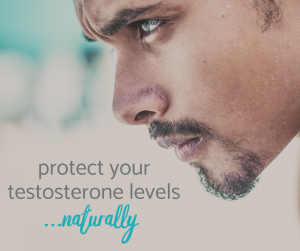
Not so shockingly, men are less likely than women to visit a healthcare provider when they’re sick. And often they wait until a medical issue has become serious before they do anything about it. Some of this tendency may be that men are less likely to ask for help in general (hence their often-joked-about difficulty with asking for directions). And some of it may be that many men simply don’t like to talk much about health issues.
The reason most commonly cited by men for avoiding medical appointments is that they feel they’re too busy. But with the rise in chronic conditions and disease, men need to be more proactive about their health. This month we’re discussing some of the most common health concerns specific to men, and natural ways to prevent and treat them.
This information doesn’t replace the need to see your doctor - in fact, we hope that it will encourage more men to take their health seriously and visit their healthcare practitioners.
1 - Prostate Enlargement
The prostate gland is one of those little-discussed body parts. However, one in every 9 men in North America will be diagnosed with prostate cancer in their lifetime. That makes it the most common form of cancer for the country’s men. The good news is that regular screening is often able to catch prostate cancer because it is generally a slow-growing cancer. The bad news is that many men don’t seek out screening at all until they have been living with the symptoms for far too long.
All men over 50 should talk about their prostate health with their healthcare provider. It’s particularly important if you have one of the risk factors for prostate cancer.
What Are The Risk Factors For Prostate Cancer?
● Obesity (having a BMI over 30)
● A family history of prostate cancer
● Eating a diet high in red meat and dairy
Some evidence suggests smoking may also be a risk factor (and even if it’s not, quitting is always a good idea anyway). As well, black men have higher rates of prostate cancer.
Benign Prostate Enlargement (BPE)
Not all prostate enlargement is cancer. In fact, a more common issue causing similar symptoms in the earlier stages is an enlarged prostate, also called benign prostate enlargement (BPE). Although it’s not prostate cancer, BPE can have a negative impact on a man’s lifestyle. That’s because it leads to frequent urination, poor control of urine flow, embarrassing “leaks,” and difficulty emptying the bladder.
About 50 percent of men will experience BPE by the age of 60, and up to 90 percent by the age of 85. In addition to age, heart disease, diabetes, and obesity are risk factors.
Fortunately there are several natural approaches that can be used to support a healthy prostate and reduce the risk of issues down the line.
Supplements To Support The Prostate
Some studies have found that the herbal remedy saw palmetto can improve men’s urinary tract function because it lowers testosterone production, which in turn can shrink the lining of the prostate. In addition, low zinc levels are indicative of BPE, so consider adding zinc supplements to your regime and increasing your consumption of high-zinc foods such as eggs and nuts. Another promising supplement, pygeum (African plum extract) has been linked with a lower risk for BPE in several studies.
Simple Dietary And Lifestyle Changes To Help Protect The Prostate
● Increase the amounts of lycopene you consume. Deep pink or red foods are good sources of lycopene, so turn to things like tomatoes, watermelon, and grapefruit.
● Stay hydrated. Make sure you drink lots of fluids during the day to support your urinary system. However, it’s best to stop drinking about two hours before bedtime if you are plagued by frequent trips to the bathroom.
● Limit or eliminate caffeine, artificially sweetened drinks, and alcohol. If you must have caffeine, choose green tea - one study found it may help prevent prostate cancer.
● Choose natural, unprocessed food whenever possible.
2 - Low Testosterone
Many signs of “low T” develop slowly over time. As a result, men often ascribe their symptoms to simply growing older. However, a reduction in testosterone levels doesn’t have to be a normal consequence of aging. Although your hormone levels do begin to drop as early as your 30’s, there are a number of steps you can take to help protect them.
Symptoms Of Low Testosterone Levels
How can you tell if you have low testosterone? Only your healthcare practitioner can make a definitive diagnosis, but the following signs could indicate it’s time to schedule an appointment.
● Lagging libido
● Unexplained fatigue
● Depression
● Irritability
● Increased body fat
● Male breast tissue growth
● Loss of muscle tone
How Can You Protect Your Testosterone Levels As You Get Older?
1. Sleep
Missing a few hours can quickly cause your levels of testosterone to drop. Try to maintain a consistent sleep schedule, and practise good “sleep hygiene” by ensuring your bedroom is dark and switching off any electronics one hour before bedtime.
2. Exercise
Working out is one of the more direct ways to give your testosterone levels a boost- there’s a reason many men feel “pumped up” after a workout. Weights are the most effective activity for raising testosterone levels, and recent studies found high-intensity interval training HIIT workouts productive in this regard.
3. Eat a balanced diet
Include plenty of good quality protein, unrefined carbohydrates, and healthy fats.
4. Keep stress levels in check.
When you’re stressed, your levels of the hormone cortisol rise. And when cortisol rises, testerone drops. So avoid chronic, long-term stress. And if you’re feeling overwhelmed, schedule some mini-breaks for yourself. Calling a time out on a hectic schedule to meditate or simply go for a short walk can pay off in the long run.
5. Watch your vitamin D levels
Spending time in the sun, or taking vitamin D supplements during the winter, can give your body a key component needed to raise your testosterone levels if they are low.
6. Talk to your healthcare provider about supplements
Studies suggest that both ginger and ashwagandha can help raise testosterone levels.
7. Avoid estrogen-mimicking materials
Many compounds found in daily life can affect your hormones because they mimic estrogen in your body. In particular, avoid materials made with BPA, parabens, and phthalates. That means not using things like plastic water bottles, air fresheners, and scented grooming products.
3 - Heart Health
Heart attacks are the leading cause of death regardless of gender. However, the average age of a first heart attack is about seven years younger for men, largely due to the protective effect of women’s hormones.
Men can take steps to protect their own heart health at any age. Although some commonly prescribed cardiovascular medications have adverse side effects, nutritional therapies show promising results in research and can be used alongside conventional medicine to support the body.
Factors That Affect Your Heart Health
Omega-3 fatty acids
Several studies have found that men who consume a lot of foods high in essential fatty acids have lower mortality rates from cardiovascular events. Foods that are especially high in omega-3 fatty acids include oily fish like salmon, walnuts, chia seeds, and flaxseed oil.
Magnesium
Magnesium is a mineral that is used by all muscles in the body to relax, and that includes the heart. A recent study found that magnesium may also help the heart repair existing damage. Foods high in magnesium include dark chocolate, avocados, tofu, and beans.
Exercise
Of course, one of the best things you can do for your heart muscle is to exercise it. It’s important to remember that you don’t have to run a marathon or spend hours in the gym. The movements of daily life (like gardening, vacuuming, and walking to the store) all contribute to a healthy heart.
Stress
Your heart is yet another body part that suffers when you’re stressed. Think about it: When your stress hormones kick you go into “flight or fight mode,” your blood pressure rises and your heart beats faster. You’re also more likely to engage in behaviours that hurt your heart, like overeating or drinking alcohol. Yes, drinking small amounts of alcohol has been shown to help heart health. But don’t forget that moderate drinking for men is two drinks a day or less.
4 - Depression
Signs of depression can be different for men than they are for women. Men are more likely to appear angry when they are suffering from depression. But the effects of this tendency to hide depression can be devastating. Consider these stats: over 30 percent of men say they have felt depressed. And the rate of suicide in men is four times that of women. You may be surprised to learn that men over 85 years of age have the highest rate of suicide of all.
If you experience any of the signs below, talk to someone immediately. Depression is treatable. There is lots of help out there.
● Difficulty concentrating
● Feelings of guilt or worthlessness
● Difficulty sleeping
● Loss of appetite
● Indecisiveness
● Agitated repetitive movements like pacing or drumming with your fingers
● Unexplained aches and pains
If you’re a man with any of the symptoms or health concerns mentioned, don’t hesitate to come in and talk about them. Taking charge of your health can help you get back to living with vitality and energy. It’s time to get started!
References:
https://www.greenmedinfo.health/blog/7-ways-prevent-and-even-reverse-heart-disease-nutrition1
https://www.ncbi.nlm.nih.gov/pubmed/18982874
https://www.huffingtonpost.ca/dr-allana-polo/holistic-mental-health_b_8270604.html
https://www.ncbi.nlm.nih.gov/pmc/articles/PMC2077351/
https://www.healthline.com/health/mens-health-concerns#circulatory-health
https://www.healthline.com/health/mens-health#doctor
https://www.sciencedaily.com/releases/2016/06/160609064534.htm
https://bmcpublichealth.biomedcentral.com/articles/10.1186/s12889-016-3706-5
https://www.prostatecancer.ca/Support/Healthy-Living-Tips/Healthy-Living-Tips-Archive/Are-you-at-Risk-of-Developing-Prostate-Cancer
https://pdfs.semanticscholar.org/3af2/cba5d0c864e798333b719f0dcb9d49611894.pdf
https://pdfs.semanticscholar.org/382c/bc37042c44ee019b3bca77af8c21e03d391f.pdf
https://www.huffpost.com/entry/the-mystery-of-declining-testosterone_b_59fcc5fbe4b0d467d4c224b3
https://www.huffpost.com/entry/the-mystery-of-declining-testosterone_b_59fcc5fbe4b0d467d4c224b3
https://www.ahajournals.org/doi/full/10.1161/01.cir.102.19.2353


